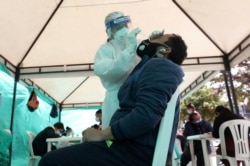Spain has declared a state of emergency and enacted a new round of lockdowns countrywide as it battles a resurgence of coronavirus infections.
“The reality is that Europe and Spain are immersed in a second wave of the pandemic,” Prime Minister Pedro Sánchez said during a nationwide address Sunday.
“The situation we are living in is extreme.”
Both Spain and France, which enacted nighttime curfews to quell the spread of the virus, have surpassed more than 1 million cases, according to data compiled by the Johns Hopkins University Coronavirus Resource Center.
Colombia also surpassed 1 million confirmed coronavirus cases Sunday.
The Latin American country recorded 8,769 new infections from Saturday to Sunday, bringing the total to 1,007,711 and the number of deaths to 30,000.
Colombia becomes the eighth country to hit the 1 million milestone, after the U.S., India, Brazil, Russia, France, Argentina and Spain. France and Spain surpassed the mark Friday.
The United States set a daily record Friday with at least 83,757 infections reported, breaking a single-day record set July 16 by more than 6,000 cases.
U.S. Vice President Mike Pence’s chief of staff, Marc Short, tested positive and began a quarantine Saturday, a spokesman said, adding that Pence and his wife tested negative and were in good health. The coronavirus causes the COVID-19 disease.
With surges in northern Rocky Mountain states and the upper Midwest, the U.S. continued to lead the world Sunday in coronavirus infections, with more than 8.5 million, and in deaths, with more than 224,000, according to the Johns Hopkins University, which is tracking cases around the world.
A new estimate by the University of Washington's Institute for Health Metrics and Evaluation has said the U.S. death toll could surpass a half-million by February unless nearly all Americans wear face masks.
It said the number of possible deaths could drop by 130,000 if 95% of Americans would wear face coverings.
The U.S. surge is similar to widespread spikes in Europe, where Paris, Rome and other large cities are imposing increasingly stringent measures to contain the spread of the virus.
The European Union's disease control agency, the European Center for Disease Prevention and Control, has joined the World Health Organization to sound the alarm over a new surge of the coronavirus across the continent, as the WHO warned that the infection is rising exponentially.
ECDC Director Andrea Ammon said Europe is facing a major threat to public health and a "highly concerning epidemiological situation."
All EU countries except Cyprus, Estonia, Finland and Greece fell into a "serious concern" category, as did Britain, the agency said.
Elsewhere in Europe, Poland has seen a sharp increase in infections, with 13,628 new cases reported Saturday. Polish President Andrzej Duda is among those who have tested positive, as the country imposed more lockdown measures including a two-week closure of bars and restaurants and students beyond third grade moving to distance learning.
As coronavirus infections in Belgium continue to reach record highs, authorities ordered the closure of the country’s cultural facilities on Saturday and announced a longer curfew beginning Monday. Brussels, home to the European Union and NATO, is among the country’s hardest-hit regions. Belgium has one of the world’s highest per capita fatality rates and currently has seen more than 10,700 deaths, as reported by Johns Hopkins.
Germany's death toll passed 10,000, according to the latest data by the university, which indicates that currently, the nation has nearly 435,000 infections.
Russia reported 16,521 new cases of infection with the coronavirus on Saturday after hitting a record high of over 17,300 on Friday. Russia has nearly 1.5 million confirmed cases, said Johns Hopkins.
In Greece, authorities imposed a nightly curfew Saturday in the Athens area and in other regions of the country with high infection rates and made it mandatory to wear face masks indoors and outdoors. The country has so far avoided the worst of the virus, reporting under 30,000 cases and 564 deaths.
Researchers around the world are racing to develop a safe and effective vaccine against the infection, which has killed more than 1.1 million globally and sickened more than 42 million.






